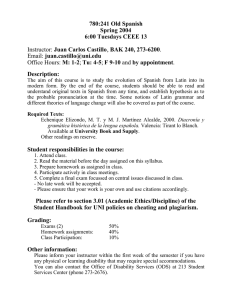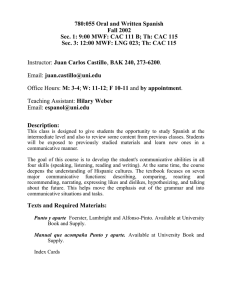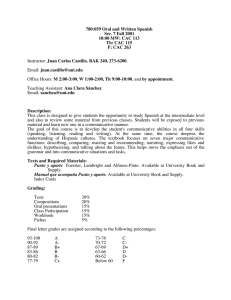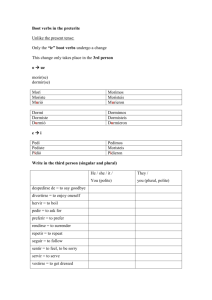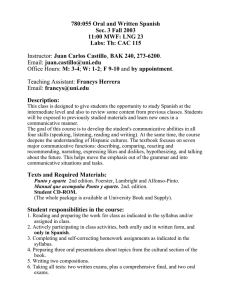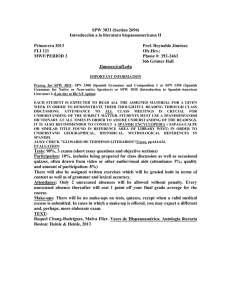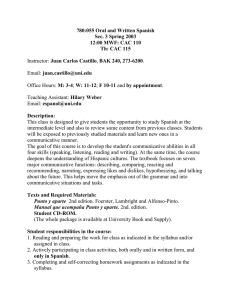780:059 Oral and Written Spanish Sec. 7 Spring 2002 Th: CAC 115
advertisement
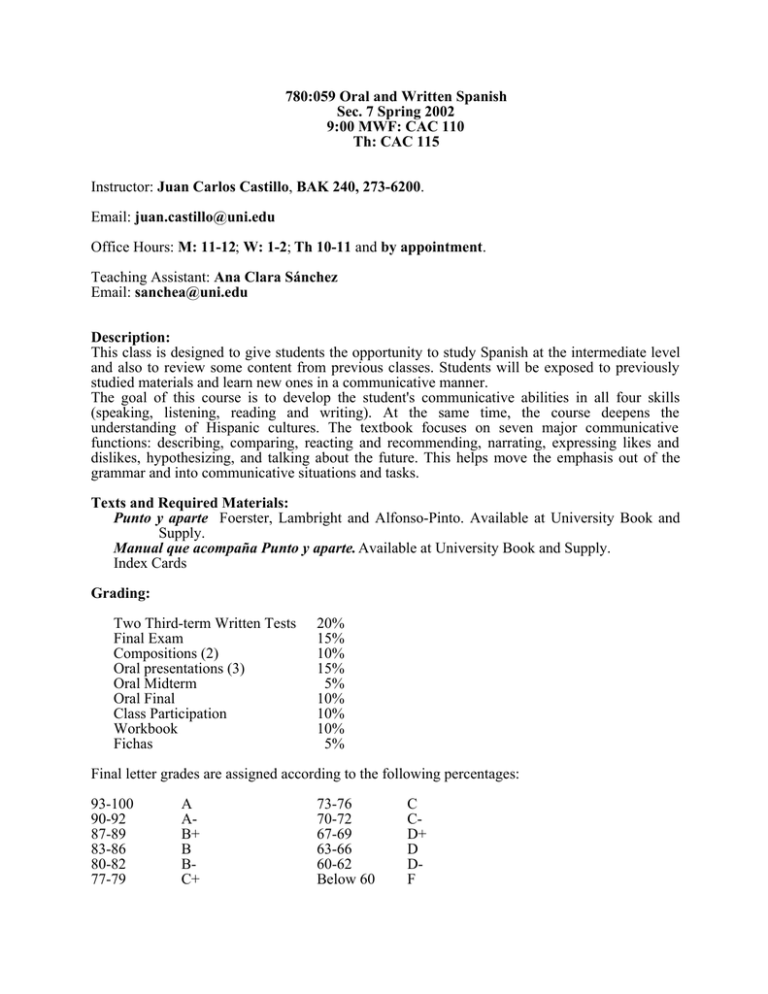
780:059 Oral and Written Spanish Sec. 7 Spring 2002 9:00 MWF: CAC 110 Th: CAC 115 Instructor: Juan Carlos Castillo, BAK 240, 273-6200. Email: juan.castillo@uni.edu Office Hours: M: 11-12; W: 1-2; Th 10-11 and by appointment. Teaching Assistant: Ana Clara Sánchez Email: sanchea@uni.edu Description: This class is designed to give students the opportunity to study Spanish at the intermediate level and also to review some content from previous classes. Students will be exposed to previously studied materials and learn new ones in a communicative manner. The goal of this course is to develop the student's communicative abilities in all four skills (speaking, listening, reading and writing). At the same time, the course deepens the understanding of Hispanic cultures. The textbook focuses on seven major communicative functions: describing, comparing, reacting and recommending, narrating, expressing likes and dislikes, hypothesizing, and talking about the future. This helps move the emphasis out of the grammar and into communicative situations and tasks. Texts and Required Materials: Punto y aparte Foerster, Lambright and Alfonso-Pinto. Available at University Book and Supply. Manual que acompaña Punto y aparte. Available at University Book and Supply. Index Cards Grading: Two Third-term Written Tests Final Exam Compositions (2) Oral presentations (3) Oral Midterm Oral Final Class Participation Workbook Fichas 20% 15% 10% 15% 5% 10% 10% 10% 5% Final letter grades are assigned according to the following percentages: 93-100 90-92 87-89 83-86 80-82 77-79 A AB+ B BC+ 73-76 70-72 67-69 63-66 60-62 Below 60 C CD+ D DF Student responsibilities in the course: 1. Reading and preparing the work for class as indicated in the syllabus and/or assigned in class. 2. Actively participating in class activities, both orally and in written form, and only in Spanish. 3. Completing and self-correcting homework assignments as indicated in the syllabus. 4. Preparing three oral presentations about topics from the cultural section of the book. 5. Writing two compositions. 6. Taking all tests: two written exams, plus a comprehensive final, and two oral exams. 7. Filling out the index cards as indicated in the textbook. Oral presentations: Every student will be required to give three brief, five minute oral presentations, working in pairs with another student. Choose a topic from the Rincón Cultural section of the textbook, and do some research about the place in question. More specific guidelines will follow. Class participation: The grade will be based on factors such as preparedness for class activities, participation in class activities (particularly, in small group activities), and use of Spanish vs. English. Just being in class does not count as participating. The use of English during the class will count against your participation grade. Attendance: Attendance is required and checked daily. You are allowed four absences. After the fourth absence, your participation grade will be lowered. The only cases in which more than four absences will be accepted are for representing the university in a University-sponsored event (documentation required) or serious illness (documentation required). If you know you will be missing class for a valid reason, talk to me ahead of time to arrange to make up the work you will miss. Workbook Assignments: Follow the instructions for each exercise, and complete the assignments timely. After you are done, you are responsible for correcting your exercise. Check the answer key at the back of the book, and correct your mistakes in a different color ink. In order to receive full credit, evidence of correction must be provided. Fichas (Index Cards): Use your fichas (3x5 index cards) to create vocabulary lists related to the topics in the Hablando del tema section of each chapter. At the end of each chapter, I will collect and grade your fichas. Requirements on compositions: 1. Compositions and other written assignments must be typed or done by computer, double spaced (so I have room for comments) with a 12-point font and 1-inch margins. Since compositions will be done in two drafts and will be revised, it is for your own convenience that you should do them by computer, including special characters, such as ñ and accent marks. 2. Compositions of more than one page must be stapled together. 3. Assignments are to be turned at the beginning of class on the day they are due. Assignments will not be accepted late except in cases of excused absences. Assignments which are not turned in are counted as zero. 4. Please note that written work done outside of class is expected to be your own work, without the help of others. This includes tutors. Please refer to pages 60 and 61 of the 2000-2002 Student Manual for further information on cheating and plagiarism. (Assignments which do not meet these requirements will not be accepted and will be counted as zero). 5. Students must turn in two drafts for each composition. The final grade of the composition (over 50 points) will be raised or lowered depending on the grade of the first draft: √+ √ √— — raises grade 2 points. leaves grade the same. lowers grade 2 points. lowers grade 5 points. 6. Failure to turn in one of the two drafts will result in a lowering of 10 points over the final grade for the composition. Other information: Please inform your instructor within the first week of the semester if you have any physical or learning disability that may require special accommodations. You can also contact the Office of Disability Services (ODS) at 213 Student Services Center (phone 273-2676). Students taking this class may qualify to obtain Credit by Exam for the prerequisite course 780:011. If you think this is your case, contact me during the first week of classes. The examination must take place during the first three weeks of the semester. This syllabus is subject to change; if you have to miss a class, make sure to check with your classmates for last-minute changes Plan de Curso Fecha Día Actividad de clase Preparación/Tarea para esa fecha Introducción: Los 5 amigos Ene 14 L Presentación 16 M Cara a Cara Leer p. 2-6 17 J Placement test 18 V Puntos clave Leer p. 9-15 ______________________________________________________________________________ 21 L Martin Luther King Day Cap. 1: Percepciones e Impresiones 23 M Situaciones Leer p. 17-23 Vocabulario 24 J Lab Manual p. 1-8 25 V Nota Cultural Leer p. 23-24 Puntos clave Leer p. 29-33 ______________________________________________________________________________ 28 L Rincón cultural: Presentaciones España Leer p. 24-29 30 M Puntos clave Leer p. 29-33 31 J Lab Manual p. 13-20 Feb 1 V Composición #1: Lluvia de ideas ______________________________________________________________________________ 4 L Hablando del tema Preparar fichas Leer p. 36-38 Cap. 2: ¿Qué importancia tienen nuestras raíces? 6 M Situaciones Leer p. 39-47 Vocabulario Comp #1, 1a. versión 7 J Lab Manual p. 20-25 8 V Nota Cultural Leer p. 48 Puntos clave Leer p. 54-57 ______________________________________________________________________________ 11 L Rincón cultural: Presentaciones Caribe Leer p. 48-53 13 M Puntos clave Leer p. 54-57 Comp #1, final 14 J Lab Manual p. 33-40 15 V Lectura Leer p. 57-63 "Soñar en cubano" ______________________________________________________________________________ 18 L Hablando del tema Preparar fichas Leer p. 63-64 Cap. 3: ¿Cómo influyen en nuestra vida los demás? 20 M Situaciones Leer p. 65-72 Vocabulario 21 J Lab Manual p. 41-48 22 V Examen Parcial #1 ______________________________________________________________________________ 25 L Nota Cultural Leer p. 72-74 Puntos clave Leer p. 78-82 27 M Rincón cultural: Presentaciones México Leer p. 74-78 28 J Lab Manual p. 59-64 Mar 1 V Puntos clave Leer p. 78-82 ______________________________________________________________________________ 4 L Hablando del tema Preparar fichas Leer p. 87 6 M Examen Oral 7 J Lab Manual p. 65-71 8 V Examen Oral ______________________________________________________________________________ 11 L Composición #2: Lluvia de ideas Cap. 4: ¿Cómo se relaja usted? 13 14 15 M Situaciones Vocabulario J Lab V Nota Cultural Puntos clave Leer p. 89-95 Manual p. 79-82 Leer p. 96-97 Leer p. 102-108 Comp #2, 1a. versión ______________________________________________________________________________ 18 – 22 SPRING BREAK ______________________________________________________________________________ 25 27 28 29 L Rincón cultural: Cono Sur M Puntos clave Presentaciones Leer p. 97-102 Leer p. 102-108 Comp #2, final Manual p. 83-88 Leer p. 108-114 J Lab V Lectura: "La vida anti-estrés" ______________________________________________________________________________ Abr 1 L Hablando del tema Preparar fichas Leer p. 114-116 Cap.5: ¿Cómo influyen en nosotros los problemas del mundo? 3 M Situaciones Leer p. 117-124 Vocabulario 4 J Lab Manual p. 97-101 5 V Examen Parcial #2 ______________________________________________________________________________ 8 L Nota Cultural Leer p. 124-125 Puntos clave Leer p. 130-134 10 M Rincón cultural: Presentaciones Región andina Leer p. 125-130 11 J Lab Manual p. 101-106 12 V Puntos clave Leer p. 130-134 ______________________________________________________________________________ 15 L Hablando del tema Preparar fichas Leer p. 141-142 Cap. 6: ¿Qué nos espera en el futuro? 17 M Situaciones Leer p. 143-149 Vocabulario 18 J Lab Manual p. 113-117 19 V Nota Cultural Leer p. 150-152 Puntos clave Leer p. 157-161 ______________________________________________________________________________ 22 L Rincón cultural: Presentaciones Centroamérica Leer p. 152-157 24 M Puntos clave Leer p. 157-161 Lectura: "Primer encuentro" Leer p. 162-166 25 J Lab Manual p. 117-122 26 V Hablando del tema Preparar fichas Leer p. 167 ______________________________________________________________________________ 29 L Repaso May 1 M Repaso 2 J Examen Oral 3 V Examen Oral ______________________________________________________________________________ Examen escrito final: Wednesday, May 8, 10-11:50 a.m.
